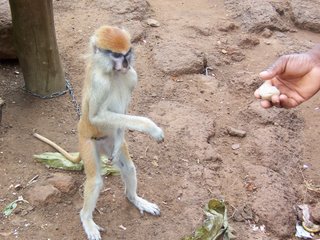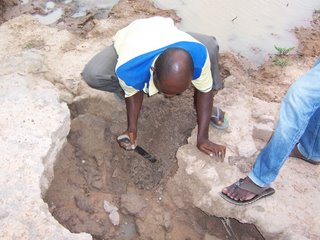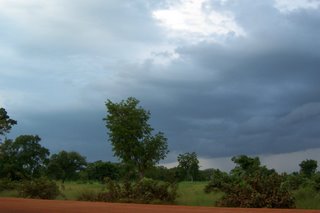Mole National Park (warning: long entry)
Kerry and I left for Mole in the pouring rain on Friday, forshadowing that this would definitely be an adventure. After running from my guesthouse to the truck that picked me up, I was completely drenched.
I had bought the tickets that morning and the bus driver said the bus left at 1:30pm- which usually means it will leave at least a half hour later. Well, we wasted some time in Tamale waiting for the fried rice man to finish frying the rice, so while we wanted to be at the station at 1pm, we were running a little behind. Instead, Kerry ran to the ATM and I ran to the bus and arrived around 1:20pm. To my surprise, the entire bus was full and practically getting ready to pull out. I had to hold the bus for the next 10 minutes while I called Kerry frantically asking what was taking so long- the bus was leaving. I kept repeating in my Ghanaian accent, “She is coming, she is coming!” (Keep in mind that the bus then hung around for about another 30 minutes before we left, just as we had suspected.)
In our hurry to make the bus, we both forewent going to the bathroom and were too afraid to ask them to let us go b/c we thought we were leaving. Big mistake. In our late arrival, our seats were given to someone else, so of course we’re in the last row of a bus that should hold around 35 people, but probably had 50. Good times.
After one hour of driving, you turn off the paved road onto a dirt road that is probably the worst flat road I have ever traveled. Do you know when a large construction machine makes little ruts in the road going horizontally? Yeah, those lovely bumps, crazy potholes, and fresh rain make for a very fun ride. I laughed and asked Kerry if this counted as a massage since every cell of muscle or fat on my body was vibrating. And for those of you who are also well endowed, you will completely understand the pain. This, combined with the fact that I was looking at the lovely scenery thinking- oh that would be a good bush to go the bathroom behind- maybe I should ask them to stop.
We also entertained ourselves by making fun of the crazy foreigners and planning our escape routes from the bus should it tip over to one side. We decided that Kerry was screwed since she was next to the window on the right side of the bus.
I did finally get to pee, thank God for small mercies, 4 hours later. I have the bladder of a champion. It was my first experience in a public urinal- basically a concrete slab with walls and a small trough for you to aim at. Hopefully your aim is good and you don’t have performance anxiety in front of the other women.
I could tell you very long stories about the bus ride that should be 3.5 hours and turned into 6, but I should get to the point where we actually got to Mole. I will say that the Mole bus has lots of sumese (white people in Dagboni). And I noticed right away that most of them had either not lived in developing countries for very long or were completely inept travelers. One girl had short, shorts on, and another was wearing a gold chain around her neck. Come on. . .I don’t care if it’s real, you’re just asking for it. A Belgian girl was asked by a young girl selling cheese to give her money- begging basically. She told her that if she gave her money then she would have to giver everyone money. She promptly pulled 5,000 cedis (way too much money to even give to a beggar) and gave it to the girl. You have just taught this girl that it is more profitable to beg than to legitimately sell something. If you want to give her money, just buy the cheese with the 5,000 even if you don’t eat it. Absolutely absurd.
Anyway, we arrived at the Mole Motel a little before 8pm and settled in for the night. The next morning I woke up early and sat on our veranda overlooking the foggy valley. The motel is set up on a ridge that overlooks the forest. It is more forest than savannah, so they have created a watering hole below the lodge and cleared some of the vegetation so that people can see the animals. A monkey came around to visit me in the morning, but he didn’t smell food so he left quickly. I was also greeted by a family of warthogs when I left the room.
We joined our walking safari around 7am and were able to immediately see a few deer-like species and a very large elephant that comes to eat around a group of houses nearby.
I was glad they forced those of with sandals to rent rubber boots, because we hiked down the ridge and through some bogs with lots of standing water. We saw monkeys, water bucks, and many different bird species on our hike through the clearing.
We ended at the watering hole with the hope that the elephants would be bathing. Unfortunately, Pekay (our guide) said it was late and they must not be coming that day. It’s hard during the rainy season because there are so many places for them to bathe and stay cool, whereas during the dry season you are sure to see them because most of the other water sources are dry. We started to hike up the hill towards the motel when we spotted three elephants approaching the watering hole. We decided to contract our guide for another hour and climbed back down to observe them getting in the water and swimming across to the other side. Very cool.
After an exhausting three hour hike on relatively empty stomachs we were tired and went to have breakfast. Originally we had grandiose ideas of renting bicycles and riding down to Larabanga (about 45 minute ride- but uphill both ways on a bicycle with no gears) to see a very old traditional mosque. They are rare in the country and a great tourist attraction. We decided that our time was maybe better spent in the pool for the rest of the afternoon, which is exactly what we did.
I had asked our guide earlier about the baboons, would we see them on our hike as well. He asked if I was staying the night and I said, “Yes.” “You will see them,” he responded.
The baboons didn’t disappoint. They are little robbers and way too accustomed to white people who are too timid to scare them away. The adult male is especially vicious if he smells any food or sees anything resembling a shiny food wrapper. At one point he tried to grab a girl’s bag out of her hands.
I got this great shot of him as he passed our table next to the pool, just before Kerry went to hit him to scare him off. She has extensive experience with monkeys who like to attack you and steal your stuff. This is handy when your companion is too busy trying to get a photo and not paying attention to the stuff.
There was also a fun incident where someone left a few bananas on one of the dining room tables. A few monkeys swung in helped themselves before they could get out of the pool.
Overall, it was great fun and I’m so glad that I went. I don’t think I could leave Africa without saying that I had seen at least some wild animals and Mole was worth it. It was “expensive” by my own daily expenditures here, but $50 for transport, lodging, food, and entertainment is certainly not expensive by our standards. Most safaris cost a lot more than that nowadays, so this was a real treat.
So if you come to Ghana, you should go to Mole, it’s a bargain adventure.
(So once again my pics are not loading, so I'll try again later.)













